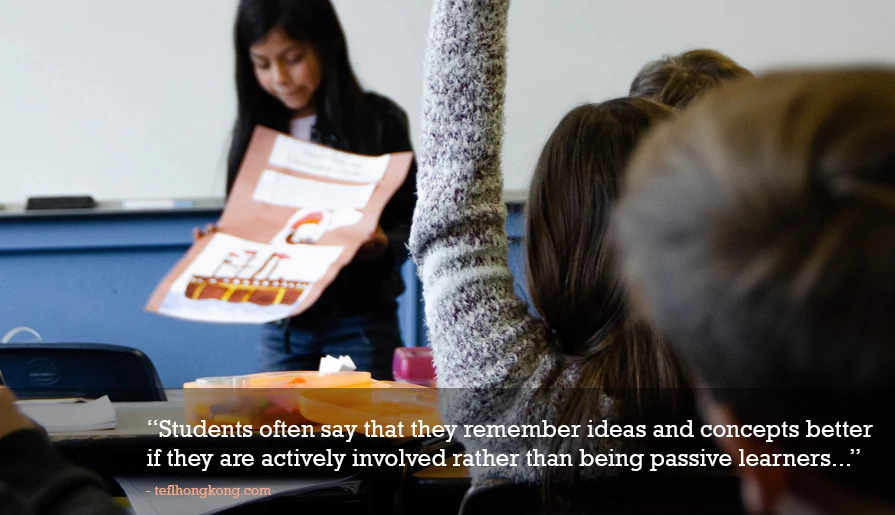
- By: Anna McIver
- In: ESL Activities
“That’s what games are, in the end. Teachers. Fun is just another word for learning!”
– Raph Koster
When I first began ESL teaching one of the things I found most difficult was using games and fun interactive activities with older students. I was used to playing games with young learners and making classes enjoyable for teenagers too, but I had never taught adults, and this was all new to me!
If you’re having similar concerns or are just looking for ways to make your adult classes a little more entertaining for both the students and you as the teacher, then look no further.
Here I will outline my top 5 games to use in the adult ESL classroom.
- A running dictation game
- Vocabulary race
- Taboo
- Grammar auction
- Timed talking
Let’s dive deep.. !
1. A Running Dictation Game
A running dictation game is an excellent way of keeping learners involved for students of any level. This task allows the practice of speaking, listening and writing and can be adapted to any topic.
First, you need a piece of text (something from the textbook, an article or whatever you’re currently working on in class).
Stick the text either at one end of the classroom or outside the door depending on your space. Arrange students into pairs. They need to decide who will be the reporter and who will be the journalist.
The journalist sits at their desk, and the reporter gets ready.
When the teacher says “go”, the reporter must run over to the text and read the first line (or as much as they can remember). They then return to the journalist and dictate what they remember, trying to be as accurate as possible. The journalist writes down what they hear.
Continue until you feel the roles should be reversed and shout “switch”. The students change roles and continue until the text is complete.
To follow up, you can then do comprehension, look at vocab or grammar from the book, and compare the original with the student’s versions and so on.
2. Vocabulary Race
A proper warmer or plenary game which requires no preparation is a vocabulary race.
All you need is a board pen per team and a board.
Write up any English word you like at the top of two columns on the board (assuming you have two teams, you can have more) and line teams up a little distance away.
Shout “go”, and the first person in each team runs to the board and writes a word beginning with the last letter of the first word.
Ex: elephant – time – egg – geography – yellow – water – and so on.
You can choose to time the game or do the first team to 20 words.
At the end of the game, check spelling for both teams and if you like, discount points for wrongly spelt words!
Alternatives for this game include focussing only on verbs, adjectives or nouns – or for higher levels you can consider having a theme to focus.
You can also ask students to write a story using their word list. I find that this often leads to some very creative ideas and some funny stories!
Students often say that they remember ideas and concepts better if they are actively involved rather than being passive learners. This is another excellent reason for using games in the adult classroom!
3. Taboo
Taboo, formerly a board game and now used by many ESL teachers is a great way to help student explain ideas and search for vocabulary.
Basically, the game involves using cards with either a keyword at the top or a keyword plus an image and a list of words below.
The student must get their partner to say the keyword without using any of the words listed.
Taboo games can, of course, be made based on the needs of your class but there are lots of free downloadables online too, which saves precious time.
Check out https://eslgames.com/esl-taboo/ to download some great sets for free. These have brightened up many an adult class of mine!
Did you know Taboo the board game was created in 1989 by Parker Brothers? It is own owned by Hasbro Games and is famous around the world!
4. Grammar Auction
A grammar auction can focus on a particular grammar point, be used to review the content at the end of a textbook chapter or focus on an area like phrasal verbs. This game is a little more time consuming to prepare, but it is worth it, for the fun your class will have!
In pairs or small teams, students must work together to bid on a series of sentences provided by the teacher. Some are correct, and some are incorrect and depending on how certain they are, the students bid higher or lower.
The teacher sets the budget at the start of the activity. The team with the most correct sentences at the end of the game are the winners!
A good example can be found here https://www.teachingenglish.org.uk/article/grammar-auction
For my classes, I have found showing a short clip of a real auction first helps to set the tone, and then allowing students to bid using sweets or candy is an excellent way to get them feeling enthusiastic!
Of course, the idea is to review the common errors at the end of the auction and assess what students did well, is an effective way to check progress but disguised as a game!
5. Timed Talking
So last but not least, I call this one Timed Talking. This game is incredibly simple and is an effective warmer, plenary or you can use it mid-class to wake everyone up a bit!
Either write up a list of topics or questions on the board or pre-prepare them on little cards and hand them out to each pair.
Encourage students to use the timer on the phones and set it for 1 minute (or the time you have decided). Students pick a card or topic and talk for the set time.
This is a nice relaxed way to encourage students to speak and means for them to avoid the possible embarrassment or nerves that sometimes come with speaking in front of larger groups. It is also a great way of helping students prepare for speaking exams.
This game is also easily adapted to describing photos, making predictions about pictures, and the length of time can be changed. You may also like to shout “all change” and have students change partners midway through too.
Conclusion: So, to sum up, I have found these games to be useful and fun with my adult classes, and I hope they work for you too. I have found that activities that involve students are the ones they learn from most, and the ones they ask to return to brighten up our classes. So why not give them a go with your classes today and see what they can gain from a little fun!
“Tell me, and I’ll forget. Show me, and I may remember. Involve me, and I learn”
– Benjamin Franklin
This article was originally published on June 3, 2020 and was last updated on June 16, 2020.
Courses We Offer:

1. CertTESOL: Certificate in TESOL
A level 5, initial teacher training qualification for new and experienced teachers, enabling you to teach English anywhere in the world. The course is equivalent to Cambridge CELTA.
Learn More
Developed by our Trinity CertTESOL experts, for a comprehensive, self-paced learning experience. Earn an internationally recognized certificate and master essential teaching skills, accessible globally 24/7.
Learn More